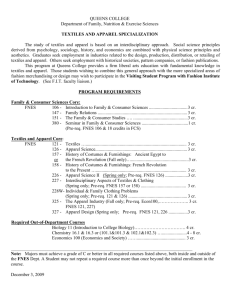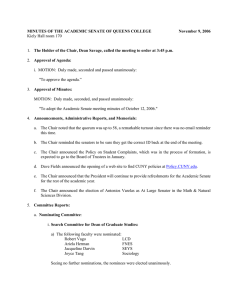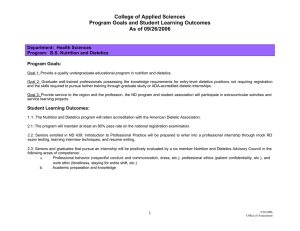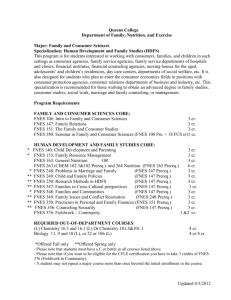Queens College Didactic Program in Dietetics
advertisement
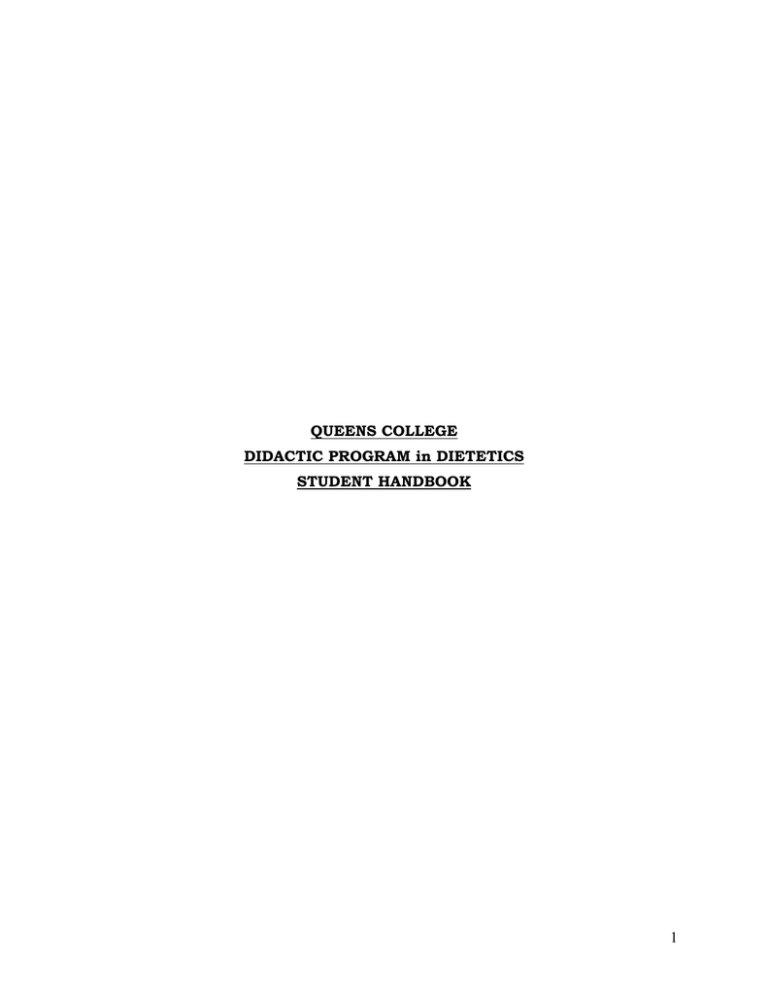
QUEENS COLLEGE DIDACTIC PROGRAM in DIETETICS STUDENT HANDBOOK 1 Queens College Didactic Program in Dietetics PROGRAM DESCRIPTION The Department of Family, Nutrition, and Exercise Sciences (FNES) of Queens College of The City University of New York offers a Didactic Program in Dietetics specialization through the undergraduate program in Family and Consumer Sciences. This program is based on The Standards of Education of The Commission on Accreditation for Dietetics Education (CADE), The Standards of Practice of The American Dietetic Association along with the goals of the FNES Department. The curriculum consists of 24 classes (79 credits) including biology, chemistry, psychology, nutrition, medical nutrition therapy, food service management and family and consumer science courses. Upon completion of the curriculum and earning a bachelor’s degree (B.A. in Family and Consumer Sciences) students will be eligible to start a CADE approved Dietetic Internship for which they have applied and been accepted into. ACCREDITATION STATUS The Didactic Program in Dietetics was reaccredited on November 5, 2010 by the Commission on Accreditation for Dietetics Education (CADE), 120 S. Riverside Plaza, Chicago, IL 60606 (phone# (312) 899-5400). The program is also accredited by the American Association of Family and consumer Sciences, and The Middle States Association of Colleges and Secondary Schools. PROGRAM MISSION The mission of the Family Nutrition and Exercise Sciences department is to prepare individuals to: assume leadership roles in family and consumer sciences; to create new knowledge through research and in-depth study of the respective disciplines; and to apply current knowledge to enhance the health and well being of individuals, families, and communities in an increasingly global society. The mission of the Didactic Program in Dietetics is to impart knowledge and develop in dietetics students the ability to solve problems and think critically. ADVISEMENT • Dietetics Advisement o • General Advisement o • Patricia Miner, MS, RD, CDN Remsen Hall, room 306 (B) patricia.miner@qc.cuny.edu, 718 997-4152, No appointment is necessary though students must come in during office hours. For office hours contact the department secretary, Mrs. Cheung at 718 997-4475, since the hours change each semester. For information about LASAR or General Education requirements students should speak with an advisor in the Academic Advisement Center, Kiely 217. Health Professions Advisement o Students planning on a career in medicine, dentistry, optometry, podiatry, chiropractic, physical therapy, nursing and veterinary medicine should see the college’s health professions advisor, Valli Cook; Science Building, B338, (718) 997-3470, qc.health.professions@qc.cuny.edu 2 CURRICULM of the DIDACTIC PROGRAM in DIETETICS FAMILY AND CONSUMER SCIENCES CORE REQUIREMENTS Introduction to Family and Consumer Sciences FNES 106 3cr. Family Relations FNES 147 3cr. (L)FNES 151 3cr. FNES 380 1cr. Family as Consumers Seminar in Family and Consumer Sciences (prereq. FNES 106 & 18 crs. In FCS) FOOD SCIENCE, NUTRITION AND INSTITUTIONAL MANAGEMENT REQUIREMENTS Science of Foods FNES 101 3cr. Social, Cultural and Economic Aspects of Foods FNES 104(F) 3cr. (prereq. FNES 101) FNES 203 3cr. (prereq. Chem. 102.3&102.1, PSYCH 107) FNES 263 3cr. FNES 264 3cr. (prereq.FNES 101) FNES275(S) 3cr. (prereq., FNES 101, FNES 263, PSYCH 107) FNES 307W 4cr. (prereq. FNES 263) FNES 337(S) 3cr. (pre or co-req FNES 264 Chem.103.3&103.1) FNES 365(F) 3cr. (prereq. Chem. 103.3&103.1, FNES 264 & 365) FNES 366(S) 3cr. (prereq Bio 43, prereq or co-req FNES 264) FNES 368(S) 3cr. FNES 378(F) 3cr. Meal Planning & Meal Management Nutrition I Nutrition II (prereq. FNES 263) Institutional Management Experimental Food Science Nutrition Education Nutrition Counseling and Assessment Medical Nutrition Therapy Life Cycle & Community Nutrition Quantity Food Purchasing, Production & Equipment (prereq. FNES 203 & 275) PSYCHOLOGY REQUIREMENTS General Psychology (L)Psych 101 4cr. Statistical Methods (L)Psych 107 4cr. SCIENCE REQUIREMENTS Basic Chemistry *(L)Chem101.3/101.1 4cr. Basic Organic Chemistry (prereq. Chem. 101.3&101.1) *(L)Chem.102.3/102.1 4cr. Basic Biochemistry (prereq. Chem. 102.3&102.1) Chem.103.3/103.1 4cr *(L)Bio. 11 4cr. (prereq. Bio. 11 and Chem. 102.3&102.1) Bio.43(F) 4cr. (prereq. Bio 9 & 10 and Chem. 102.3&102.1) Bio.44(S) 4cr. Introduction to College Biology Anatomy & Physiology Food and Human Microbiology * Alternative Courses: CHEM. 113 = CHEM. 101.3&101.1; CHEM 251/252 = CHEM 102.3&102.1; BIOL. 105/108 = BIOL. 11 (F) Fall only; (S) Spring only; (L) LASAR, (Liberal Arts and Sciences Area Requirement) 3 Credits for Fieldwork FNES 371, 372, or 374, (for one or two credits) can be considered during the students’ junior and/or senior year. Fieldwork courses allow students to increase on the job critical thinking skills while obtaining volunteer experience. See Dr. Lowe, Chair of the FNES Department, for details, Remsen 305. PROGRAM COMPLETION REQUIREMENTS • • • To receive an American Dietetic Association (ADA) Verification Statement attesting to the satisfactory completion of the Didactic Program in Dietetics (DPD) the student must have: Earned a Bachelor’s degree and Completed the DPD curriculum; with a C or better in all courses, including all required prerequisite courses before advancing to the next level course earn an overall GPA of 2.0 or better Verification Statements will be mailed to all students meeting the above criteria within 8 weeks of the date of their graduation/completion of the DPD curriculum. There is no maximum time allotted to complete the program requirements. T0 BECOME A REGISTERED DIETITIAN • What is a Registered Dietitian? Registered Dietitians (RD) are food and nutrition experts. • How do you become a Registered Dietitian? 1. Academic Requirements • You must earn an ADA Verification Statement (see section above on Program Completion Requirements). 2. Dietetic Internship • You must apply and be accepted into an ADA accredited Dietetic Internship (DI). • Internships consist of 1200 hours of supervised learning experiences, post baccalaureate. Go to the ADA website (www.eatright.org) for a list of all the Dietetic Internships in the United States. • Internships are highly competitive with only ~50% of students who apply nationwide achieving acceptance into a DI each year. To be a competitive student an overall GPA of > 3.3 and volunteer/work experience are recommended. Successful completion of the Dietetics program does not guarantee acceptance into a Dietetic Internship. 3. Registered Dietitian (RD) Exam • • Once you complete the Dietetic Internship you may apply to take the national registration examination from the ADA’s Commission on Dietetic Registration (CDR). When you pass the exam you may then use the RD after your name. • Once you pass the registration exam you should also apply to the New York State Education Department for Certification as a Dietitian/Nutritionist (CDN). How can I find volunteer and work experience in dietetics? • Besides the bulletin board across from Remsen 310, where volunteer and paid jobs for dietetic students are posted, the following sites may be of benefit: NY_RD_News-subscribe@yahoogroups.com (You must email them saying “Please subscribe.”) 4 • Can I obtain a job without being an RD? • • www.ADACareerLink.org, www.Nutritionjobs.com, www.justfood.org Yes, jobs can be obtained in nursing homes, hospital food service and government agencies as diet aides, supervisors and managers. Is networking and community participation an important aspect in advancing my career? • Yes, working with others broadens your experience and allows others to learn of your strengths. One way to do this is by joining a FNES club such as the; o Jr. American Dietetic Association (student chapter) www.facebook.com/group.php?gid=173687625552 o Phi Upsilon Omicron (Family and Consumer Sciences Honors Society) (junior status and GPA of 3.0 required) SAMPLE PLAN of STUDY • The 120 total credits needed to earn a Bachelor’s degree including the LASAR/General Education Credits (PLAS-Perspectives on the Liberal Arts and Sciences) are not incorporated into this plan of study. Year 1 Fall FNES 101 FNES 106 PSYCH 107 CHEM 101.3/101/1 Spring FNES 203 FNES 151 BIO 11 CHEM 102.3/102.1 Credit Science of Foods Introduction to Family and Consumer Sciences Statistical Methods Basic Chemistry Meal Planning and Meal Management Family as Consumers Introduction to College Biology Basic Organic Chemistry Year 2 Hours 3 3 4 4 14 3 3 4 4 14 Fall FNES 263 BIO 43 FNES 104 FNES 147 Nutrition I Anatomy and Physiology Social, Cultural and Economic Aspects of Foods Family Relations 3 4 3 3 13 Spring FNES 264 FNES 275 FNES 337 CHEM 103.3/103.1 Nutrition II Institutional Management Nutrition Education Basic Biochemistry 3 3 3 4 13 Year 3 Fall FNES FNES FNES FNES 365 378 307W 380 Nutrition Counseling and Assessment Quantity Food Purchasing, Production & Equip Experimental Food Science Seminar in Family and Consumer Sciences 3 3 4 1 11 Spring 5 FNES 366 FNES 368 BIO 44 PSYCH 101 Medical Nutrition Therapy Life Cycle and Community Nutrition Food and Human Microbiology General Psychology 3 3 4 4 14 POLICIES and PROCEDURES • • • • Admission o To apply go to www.qc.cuny.edu/admissions o Students accepted into Queens College will be accepted into the Didactic Program in Dietetics though you must see the Dietetics Program Director for Advisement. See section Advisement/Dietetics Advisement, Evaluation of transfer credits: o Admissions will evaluate all courses taken at another institution. Up to 75 credits can be transferred, including 12 credits from a non-accredited institution. Your approved transfer credits approved by the Queens College Office of Admissions must be conveyed to the Dietetics Program Director. Please bring your Transfer Evaluation Form and/or your transcripts to Professor Patricia Miner, Remsen 306 (B) during her office hours. Only dietetics equivalent courses where a grade of C or better was earned will be accepted for transfer credit by the Dietetics Program Director. o Credit is not given for prior experience. o Students who have completed a Bachelor’s degree at an international university must complete a course-by-course evaluation of their foreign transcript by an approved American Dietetic Association agency. An example is World Education Services (www.wes.org). To view a more extensive list of approved agencies go to the ADA website http://www.eatright.org/CADE/content.aspx?id=9725 . o We have articulation agreements with Suffolk Community College and LaGuardia Community College. Credits within their Dietetic Technician programs have been previously approved for transfer credit. Further information can be obtained by emailing patricia.miner@qc.cuny.edu Early (pre) Registration o Pre-registration is available to FNES students for FNES/Bio/Chem curriculum courses. Only students who have declared their major with FNES can preregister. o Early registration is the first week in November for the Spring semester courses. o Early registration is the last week in March or the first week in April for the Summer and Fall semester courses. o Check your QC email for notification or visit the FNES office, Remsen 306. Forms requesting your first and second choice of courses must be filled out by you and returned to the department by the stated due date. If you are late for early registration you most likely will not be able to be placed into the classes you require. o General Education Requirements (LASAR or PLAS) and Electives must be registered on-line on your registration date assigned to you by the Registrars office. Computer Lab o The computer lab located in Remsen Hall, room 309 is for FNES students only. It is available for use Monday-Friday 9-5, when the FNES department lab technician is present. o Copies can be printed in the computer lab at .10 per copy 6 using your Queens College ID card, though $15 is put on to your card the beginning of each Fall and Spring semester. Copies can also be made in the I Building and the Library. Money can be added to your ID card at a specialized machine located in the library, I Building, Powdermaker Hall and the student cafeteria. • o Nutritionist Pro, Food Processor and SPSS are available for student use on the computers in the FNES computer lab. Students can also access Microsoft Office and the Internet. o NO FOOD or DRINKS are allowed in the computer lab. Talking on cell phones in the lab is prohibited. Grievance Procedures o Should a student have a grievance (i.e., disagreement with grade calculated) the following procedure should be followed: 1. First, discuss the grievance with the instructor. 2. If dissatisfied with the instructor’s explanation, the student must discuss the matter with the FNES Department Chair, Dr. Elizabeth Lowe. 3. If the matter is still not resolved, make an appointment with the Divisional Dean, Dr. Larry Liebovitch. 4. After the above steps have been exhausted; a. For grades contact the Undergraduate Scholastic Standards Committee (USSC) for a formal appeal. Additional information can be obtained at the USSC office in Frese Hall. b. For other complaints contact the Vice President for Student Affairs, Dr. Joseph Bertolino; Frese Hall, room 102, email: vpsa@qc.cuny.edu, 718 997-5500. NON-DISCRIMINATION and EQUAL OPPORTUNITY • “It is the policy of Queens College of the City University of New York to recruit, employ, retain, and promote employees and to admit and provide services for students without regard to sex, age, race, color, national or ethnic origin, religion, sexual orientation, veteran or marital status, or disability.” For more specific information, see Queens College Graduate Bulletin (catalog) page 30. o Should a student believe he/she has been discriminated against based on age, sex, sexual orientation, alienage, or citizenship, religion, race, color , national or ethnic origin, disability or veteran or marital status they should: o Contact the Coordinator for Title IX in Kiely 805, 718 997-5725 preferably within 30 days of the incident. The International Students and Scholars Office is also available to “assist students… in obtaining and maintaining the F-1 International Student and J-1 Exchange Visitor, U.S. Visa-Immigration Status for the purpose of studying, teaching, and/or conducting research at the college/university on a short-term basis”. Student Union, room 327, 718 997-4400, M-F 9am-5pm. http://www.qc.cuny.edu/StudentLife/services/intstudents/Pages/default.aspx FORMAL ASSESSMENT and ACHIEVEMENT OF STUDENT LEARNING • Student learning is assessed by the grades earned on exams and class assignments as outlined in each course syllabus. • Grade and Grade Point Average (GPA) Equivalencies at Queens College: 7 • A+ 97- GP 4.0 B+ 87-89 GP 3.3 C+ 77-79 GP 2.3 D+ 67-69 GPA 1.3 A 93-96 4.0 B 83-86 3.0 C 73-76 2.0 D 60-66 1.0 A- 90-92 3.7 B- 80-82 2.7 C- 70-72 1.7 F <60 0.0 Students are expected to read the chapters and any other required material prior to each class. For every hour of class time it is expected students will devote a minimum of 2 hours of study time (ex., a 12 hour per week course load will require 24 hours of study time per week, every week). o To improve your study skills you can participate in free workshops at the Academic Support Lab, 718 997-5677, Kiely 131. http://qcpages.qc.cuny.edu/asc/ o To improve your writing skills the Writing Center offers individual tutoring; 718 997-5676, Kiely 229. http://qcpages.qc.cuny.edu/Writing/helpwriting.htm o Students for whom English is not their native language can contact the English as a Second Language Program (ESL); 718 997-5712, Kiely 111. http://qcpages.qc.cuny.edu/esl • • Full-time students should limit their paid work to 20 hours or less per week. It is recommended that students planning on becoming Registered Dietitians (RD) retain their notes from all DPD courses, particularly FNES 101, 104, 203, 263, 264, 275, 307, 337, 365, 366, 368, 378, 380, Chem 103, Bio 43, Bio 44 to use as a review for the RD exam. This can be supplemented with taking a formal review course (i.e., Jean Inman: inmanassoc.com, or Breeding & Associates: dietitianworkshops.com). • Computerized sample of RD review questions are available through the ADA products webpage (eatright.org). DISCIPLINARY/TERMINATION PROCEDURES • • Retention in the program: o A grade of C or higher must be obtained in all courses within the Didactic Program in Dietetics (DPD). If a grade below C is earned a student may repeat any of the DPD courses once. If a grade below C is earned upon repeating the course the student must change their major. o At the end of each Fall and Spring semester students with a GPA of less than 2.0 will be placed on academic probation by the Undergraduate Scholastic Standards Committee (USSC). While on probation a student cannot register for more than 13 credits. If over the next semester (not including Winter or Summer session) if a student earns a cumulative GPA above 2.0 they will be removed from academic probation. Additional information can be obtained at the USSC office in Frese Hall. Academic Dishonesty o “Academic dishonesty is one of the most serious offenses within the academic community. Acts of academic dishonesty include but are not limited to, plagiarism and/or cheating on exams and papers, sabotage of research materials, the purchase or sale of academic papers, and the falsification of records. Any student who engages in an activity that is academically dishonest is subject to academic and/or disciplinary sanctions” (QC Bulletin, p61). 8 http://www.qc.cuny.edu/Academics/Documents/115980.pdf COST • All items below are per semester. We have a Fall and Spring semester. We also have winter and summer sessions which do not have to be attended, though if attended these sessions require separate fees. You can find the winter and summer session fees on the webpages listed below each category. The fees listed below do not include food, entertainment and travel costs. • Tuition, Activity, Consolidated Service and Technology Fees for Residents of New York State o • Tuition, Activity and Technology fees for Out of State Students http://www.qc.cuny.edu/admissions/bursar/Pages/QCTuitionCosts.aspx o • $2415 per semester and Activity, Consolidated Service and Technology Fees: $238.25 Tuition: $435 per credit with no maximum tuition charges Activity, Consolidated Service and Technology Fees: $238.25 Dorming on campus http://www.thesummitatqc.com/pricing.html o includes a kitchen (stove, refrigerator, microwave), 1 bathroom for 2 people, small living room • • • • Cost per student per semester: • Start at $4,460 • Prices vary with size, number of bedrooms, and location of suite Books o ~$500 per semester Lab Fees o Lab classes have an additional fee of $90 per class. Paper Copies o .10 per sheet after using $15 provided on your Queens College ID card each Fall and Spring semester. PAYMENT and REFUND OF TUITION FEES • Payment o Your tuition bill is no longer mailed to you. You must obtain the information from your CUNYFIRST account. o If you do not have a Queens College email account, go to (cams.qc.cuny.edu) and register for one immediately. o IF YOU DO NOT PAY YOUR BILL BY THE DUE DATE YOU WILL BE DROPPED FROM THE CLASSES YOU REGISTERED FOR AND ANOTHER STUDENT MAY TAKE YOUR PLACE. • Financial Aid o Contact the financial aid office for information about the various grant, work and loan programs offered by New York State and the federal government; 718 997-5100, Jefferson Hall 202. http://www.qc.cuny.edu/admissions/fa/Pages/default.aspx • Refunds In order to receive a 100% refund of line tuition, a student must drop course(s) on 9 through eSIMS before the official opening day of classes. Fall and Spring refunds are made according to the following schedule: Withdrawal from course(s) at least 1 day before official scheduled opening of semester 100% Withdrawal from course(s) within 1 week after scheduled opening of the semester 75% o Withdrawal during 2nd week after official opening of the semester 50% o Withdrawal during 3rd week after official opening of the semester 25% o Withdrawal after completion of 3rd week after official opening of semesterNone o o The last day to add a course is one week after classes begin. Application for tuition refunds for extenuating circumstances should be made in writing to the Registration Review Committee c/o the Registrar’s Office (Jefferson Hall, Room 100.) Except as otherwise noted, no other fees are refundable. For further information, see the Undergraduate Bulletin on-line at www.qc.cuny.edu. PROTECTION OF PRIVACY • The student’s right to privacy shall be protected in accordance with the provisions of the Federal Education Rights and Privacy Act of 1974. “Students have the right to be advised of which student records and information are maintained by the College, who maintains them, who has access to them, for which purposes, policies for reviewing and expunging them, procedures for granting students access, and for challenging the records, cost charged for copies, and other rights and requirements under the Act. All of this information is available from the Registrar, Jefferson 100, during the hours the office is open.” For further information, see Queens College Undergraduate Bulletin. ACCESS TO PERSONAL FILES • Students’ advisement and verification records will be kept in the office of the Family, Nutrition and Exercise Sciences department. PROGRAM GOALS, OUTCOMES and EXPECTED STUDENT LEARNING OUTCOMES Program Goals and Outcomes: Goal #1 The program will ensure students have been apprised of the requirements to fulfill the Didactic Program in Dietetics. Expected Outcome: 85% of students enrolled in the initial professional course, Nutrition I in our bachelor level DPD are expected to complete program/degree requirements within 6 semesters. Expected Outcome: All DPD majors will be provided individual advisement upon declaring their major. Goal #2 The program will enable students to enter careers, internships or graduate studies to prepare them to become leading citizens improving the well-being of individuals, families, and communities in an increasingly global society. Expected Outcome: over a five year period, 60% of DPD graduates will apply to supervised practice programs the academic year they complete the program. Expected Outcome: over a five year period 80% of those applying to supervised practice programs the academic year they complete the program will be accepted. Expected Outcome: 80% of students surveyed, who have not been accepted into a Dietetic Internship, will be enrolled in graduate studies and/or working in a field addressing the health and well being of individuals, families and/or communities. 10 Expected Outcome: the pass rate of first-time test takers on the registration examination over a five year period will be at least 80%. Goal #3 The program will prepare students to apply current knowledge within their discipline to enhance the health and well being of individuals, families, and communities. Expected Outcome: DI Directors of programs accepting our students will indicate an overall satisfaction (3.5 on a Likert scale of 1-5) with the student’s level of nutrition, science, social sciences, food service and cultural knowledge as well as satisfaction with their problem solving, communication and research skills. Expected Outcome: DPD graduates will indicate an overall satisfaction (3.5 on a Likert scale of 1-5) with the program’s ability to impart knowledge on nutrition, science, social sciences, food service and cultural food and nutrition issues as well as satisfaction with learning problem solving, communication and research skills. Curriculum Objectives o o o o o o o o o o o o o o The curriculum reflects the scientific basis of the dietetics profession including research methodology, interpretation of research literature and integration of research principles into evidence-based practice. The curriculum includes opportunities to develop a variety of communication skills sufficient for entry into pre-professional practice. The curriculum provides principles and techniques of effective counseling methods. The curriculum includes opportunities to understand governance of dietetics practice, such as the ADA Scope of Dietetics Practice Framework, the Standards of Professional Performance and the Code of Ethics for the Profession of Dietetics; and interdisciplinary relationships in various practice settings. The curriculum reflects the nutrition care process and includes the principles and methods of assessment, diagnosis, identification and implementation of interventions and strategies for monitoring and evaluation. The curriculum includes the role of environment, food, nutrition and lifestyle choices in health promotion and disease prevention. The curriculum includes education and behavior change theories and techniques. The curriculum includes management and business theories and principles required to deliver programs and services. The curriculum includes content related to quality management of food and nutrition services. The curriculum includes the fundamentals of public policy, including the legislative and regulatory basis of dietetics practice. The curriculum includes content related to health care systems. The food and food systems foundation of the dietetics profession is evident in the curriculum. Course content includes the principles of food science and food systems, techniques of food preparation and application to the development, modification and evaluation of recipes, menus and food products acceptable to diverse groups. The physical and biological science foundation of the dietetics profession is evident in the curriculum. Course content includes organic chemistry, biochemistry, physiology, genetics, microbiology, pharmacology, statistics, nutrient metabolism, and nutrition across the lifespan. The behavioral and social science foundation of the dietetics profession is evident in the curriculum. Course content includes concepts of human behavior and diversity, such as (principles of) psychology, sociology or anthropology. 11
